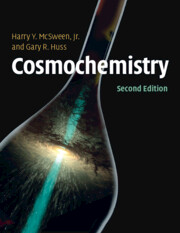
-
Select format
-
- Publisher:
- Cambridge University Press
- Publication date:
- 10 February 2022
- 03 March 2022
- ISBN:
- 9781108885263
- 9781108839839
- Dimensions:
- (246 x 189 mm)
- Weight & Pages:
- 1.31kg, 452 Pages
- Dimensions:
- Weight & Pages:
You may already have access via personal or institutional login
Book description
Cosmochemistry is a rapidly evolving field of planetary science and the second edition of this classic text reflects the exciting discoveries made over the past decade from new spacecraft missions. Topics covered include the synthesis of elements in stars, behaviour of elements and isotopes in the early solar nebula and planetary bodies, and compositions of extra-terrestrial materials. Radioisotope chronology of the early Solar System is also discussed, as well as geochemical exploration of planets by spacecraft, and cosmochemical constraints on the formation of solar systems. Thoroughly updated throughout, this new edition features significantly expanded coverage of chemical fractionation and isotopic analyses; focus boxes covering basic definitions and essential background material on mineralogy, organic chemistry and quantitative topics; and a comprehensive glossary. An appendix of analytical techniques and end-of-chapter review questions, with solutions available at www.cambridge.org/cosmochemistry2e, also contribute to making this the ideal teaching resource for courses on the Solar System's composition as well as a valuable reference for early career researchers.
Reviews
‘Cosmochemistry deserves a wide distribution as a text for undergraduate and research students. Indeed, the book is worthy of the American Astronomical Society’s Chambliss Astronomical Writing Award given for textbooks at either the upper-division or graduate level.’
David L. Lambert - The Observatory
‘The authors … have done an admirable job of providing context for the ongoing research in this field, and the current and anticipated results from the exploration of the solar system by spacecraft, including returned samples from asteroids, the Moon, and Mars.’
Christopher Herd Source: American Mineralogist
‘It would be effectively impossible for any textbook to capture the current state of cosmochemistry, given the pace of discovery. The authors … acknowledge that their book is a snapshot. However, they have done an admirable job of providing context for the ongoing research in this field, and the current and anticipated results from the exploration of the solar system by spacecraft, including returned samples from asteroids, the Moon, and Mars.’
Christopher Herd Source: American Mineralogist
Contents
Metrics
Altmetric attention score
Full text views
Full text views help Loading metrics...
Loading metrics...
* Views captured on Cambridge Core between #date#. This data will be updated every 24 hours.
Usage data cannot currently be displayed.
Accessibility standard: Unknown
Why this information is here
This section outlines the accessibility features of this content - including support for screen readers, full keyboard navigation and high-contrast display options. This may not be relevant for you.
Accessibility Information
Accessibility compliance for the PDF of this book is currently unknown and may be updated in the future.


